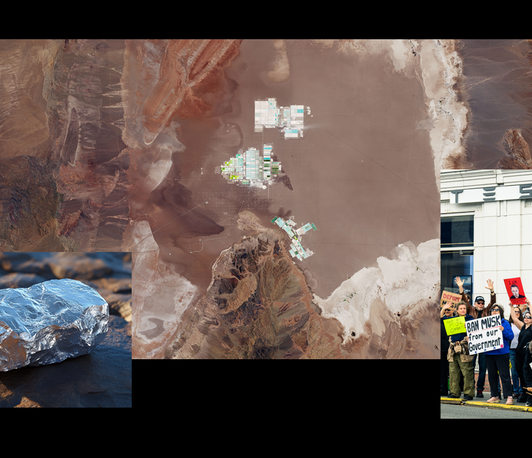Mining Conversations. The Futurepasts of ... Lithium
The series is hosted by the Max Planck Institute of Geoanthropology and the Anthropocene Commons network.
- Date: Jun 26, 2025
- Time: 08:00 PM - 09:30 PM (Local Time Germany)
- Speaker: Karolína Žižková, Czech Academy of Sciences & Masaryk University/ Verónica Zuccarelli Freire, Alexander von Humboldt Postdoctoral Fellow, MPI GEA/ Kassandra Lisenbee, Earthworks/ Berenika Boberska, Feral Office, Los Angeles
- Location: online
- Host: Max Planck Institute of Geoanthropology and Anthropocene Commons
- Contact: rossee@gea.mpg.de

Mining Conversations invites you to join its second online session The Futurepasts of … Lithium. The monthly online series critically reflects and discusses extraction and energy landscapes, across geographies and temporalities—up to this moment in which resource regimes more than ever shape economic, societal and environmental realities planetarily and locally in very unequal ways.
About the speakers
After exciting two sessions on Copper and Forests, Mining Conversations | The Futurepasts of … invites to the third session of its online series – this time on the highly current resource of Lithium.
Mining Conversations are an open monthly online space for exchanges and collaborations across practices, temporalities, and across extraction and energy landscapes.
The session will host the following speakers:
Karolína Žižková is an environmental anthropologist. As a PhD student at the Institute of Sociology of the Czech Academy of Sciences and the Department of Environmental Studies at Masaryk University, she studies conflicts related to energy transformation from a political ecology perspective. Her focus includes mining, landscape transformation, and land use issues. Karolína enjoys participating in projects linking the arts with social and natural sciences.
Verónica Zuccarelli Freire is an archaeologist and her research focuses on agricultural practices and their historical and contemporary significance in the Andean regions of northwest Argentina. Using a multidisciplinary approach—including ethnography, archaeobotanical and soil analysis and spatial modeling—she explores agroecosystems in extreme environments such as the High Andean Plateau and Neotropical seasonally dry forests over the past 2,000 years. She studied at the University of Buenos Aires and held postdoctoral positions in Argentina and the Max Planck Institute of Geoanthropology. Outside of academia, she worked as a consultant for Argentina’s Ministry of Agriculture. Currently, she leads a project on ancient agro-ecosystems and climate change, supported by the Alexander von Humboldt Foundation, with a focus on recognizing agrarian landscapes as cultural heritage and promoting sustainable land-use strategies in the face of climate change and escalating neoextractivism.
Kassandra Lisenbee is Earthworks South West organizer. Born and raised in Nevada she has a passion for water and protecting desert ecosystems. Kassandra received a B.S. from the University of Nevada, Reno in Geography; specializing in environmental policy and management. While researching water rights Kassandra dove into mining corporate accountability and has remained working with communities on issues related to hard rock mining. With 5+ years experience she is committed to supporting both human and non-human communities in the southwest US and abroad. Since 1988, Earthworks has helped communities secure protections of their health, land, water, and air from extractive industries. Earthworks is the only national organization in the U.S. to focus exclusively on preventing the destructive impacts of the extraction of oil, gas, and minerals.
Berenika Boberska is the founder of Feral Office based in Los Angeles - a practice at the intersection of architecture, landscape futurism and speculative folklore.
She describes her studio as being akin to a laboratory, constructing ‘future artefacts’, spatial prototypes and scenarios for some of the more extreme rural hinterlands of Los Angeles. Her projects and teaching engage territories which have been largely overlooked by architecture: the anthropogenic landscapes of agricultural or mineral overdrive, altered grounds, post extraction spoils and spillages, and their emerging darker ecologies. She taught at Woodbury School of Architecture in Los Angeles, where she was the co-founder of the Hinterlands Institute, a series of expeditions, fieldwork-based design studios and exhibitions that engaged with the precarious flourishing of such tailings - both material and metaphoric. Most recently she was the Mitchell visiting professor of architecture at the School of The Art Institute of Chicago. Berenika Boberska was born in Poland and grew up in the UK, she holds a Master of Architecture from the Bartlett School of Architecture, University College London, and a Master of Fine Art from the Royal College of Art in London.